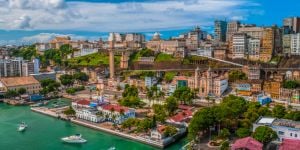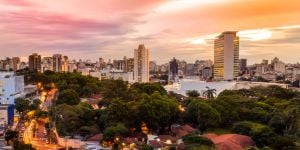
With a population of more than 212 million and a growing middle class, Brazil represents many investment opportunities. Real estate, tourism, restaurants and bars, and private schools represent some of the possibilities. However, Brazil remains a highly bureaucratic country that isn't especially conducive to business. Be sure to do your due diligence before launching any business endeavor here. You can begin educating yourself at the Brazilian Ministry of Foreign Affairs or Ministry of Taxes.
Good to know:
The most common ways to invest in Brazil are via the purchase of real estate in the country or through the opening of a brick-and-mortar business.
Real estate
Real estate represents the easiest way for the savvy investor to invest in Brazil.
Foreigners have shown keen interest in Brazil in the past 15 years or so. This interest should come as no surprise. Brazil possesses a unique and vibrant culture, and many lovely areas. Its coastline stretches for thousands of kilometers. The weather throughout most of the country is tropical or subtropical. It doesn't experience earthquakes or hurricanes, and only rarely sees a tornado. Add to this the fact that land and buildings are generally cheaper here than in Europe or North America, and you'll see exactly why there's been a real estate boom in Brazil.
Beginning around 2000 and continuing until about 2013, there was unbridled construction in many parts of Brazil, notably in the northeast, but in other pockets as well. Then, the recession hit. The result is that there's now a glut of units on the market, particularly in beachfront areas, very much like what was seen in the US, Spain, and other countries several years back. As of 2021, the demand for houses in this area is still high, especially for those looking to invest in second homes (both Brazilians and foreigners), since northeast Brazil is a prime vacation spot.
There's a buyer's market and opportunities for those who can invest now and wait a bit to see a return. It's true that the pandemic hurt Brazil's economy, but it had that effect on the whole world. The fact is, there are still moderate interest rates and high returns. And the demand for properties from Brazilians alone has grown so much in 2020 that real estate is actually the main driving factor for the country's economy!
Not to mention, the currency exchange is currently favorable as well. For example, back in 2014, a square meter of Brazilian property cost around $3,040 USD. But thanks to the devaluation and depreciation of the Brazilian real, that's jumped down to $1,344 in 2020. This means it's highly advantageous to purchase property as an American (or someone who has a good amount of US dollars saved up), as the price per square meter has decreased by almost 45%.
Add in the fact that the value of Brazilian property will naturally appreciate, then it'll be doubly advantageous to get in on the Brazilian real estate world.
Owning property as a foreigner
Foreigners can own property, with just a couple of restrictions. Here are a few points to be aware of:
- While foreigners may own real estate in Brazil, they're prohibited from owning land bordering another country or large farms, restrictions which won't apply to most.
- Title insurance isn't common in Brazil. Therefore, hire a competent real estate attorney to check for any liens or encumbrances.
- Financing is difficult for foreigners to obtain in Brazil. And in any case, bank interest rates are quite high. Developers may provide some financing in the current down market, but it's best to come armed with cash.
Opening a company
Opening a business in Brazil isn't straightforward, and neither is closing a business should you find that it isn't going well. Accordingly, enlist a local attorney and do very thorough research before deciding to open a company in Brazil. Here are a few important points to note:
- You'll need to have a local partner, who can be either a Brazilian or foreigner with permanent residency. In one way, this is good, as you'll want a local adviser. But it, of course, means first locating a person you trust.
- Financing a project can be quite complicated for an expat in Brazil, and interest rates are often absurdly high. Brazil's taxation code is complex and special assessments are common. So consult with a financial advisor who knows Brazil well.
- Be aware that labor laws strongly favor employees in Brazil. It's typically neither easy nor inexpensive to fire an employee.
Business opportunities in Brazil
Despite the caveats above, there are solid investment business opportunities in Brazil. Quite often, foreigners choose to open one of these businesses:
- Language schools: These are a huge business in Brazil today, as Brazilians want to learn not only English, but also French, German, Italian, Chinese, and other languages. An English-speaking foreigner opening an English school automatically has credibility and could do well.
- Hotels: Many foreigners find an enjoyable life in Brazil living in a tourist location and operating a pousada (small hotel).
- Nationality-based restaurants or bars: English or Irish pubs are examples of businesses that often fare well here. Australia's Outback restaurant chain has also been wildly successful.
Other investment opportunities in Brazil
If owning property or starting a business isn't interesting to you, then you might be wondering about other investment opportunities in Brazil. Here are some key ones you should consider.
Stocks
Stocks are the tried and trusted way to invest, wherever you are in the world. Of course, you can always trade on Brazil's own stock exchange, Brasil Bolsa Balcao S.A.
But if you'd like easy entry, the best thing to do is to invest in US-listed exchange-traded funds (ETFs). The most notable ones you should consider include iShares MSCI Brazil Index ETF, VanEck Vectors Brazil Small-Cap Index ETF, and Global X Brazil Consumer ETF. Respectively, each of these is on the New York Stock Exchange (NYSE) under the following names: EWZ, BRF, and BRAQ.
You can also purchase American Depository Receipts (ADRs) to invest in Brazilian stocks. The benefit of doing so is you can buy in US dollars if that's your currency of choice. Plus, they're sold on US stock exchanges. ADRs of interest include Petroleo Brasileiro SA ADR (PBR), Vale SA ADR (VALE), and Itau Unibanco Holding SA ADR (ITUB).
If you want to invest in Brazil's own stock exchange (also known as the B3), then you can directly purchase Brazilian securities here. However, this can be quite complicated, as you'll need someone local to act as your custodians. You'll also need to register with the Brazilian Central Bank and other agencies regarding taxes.
Agriculture
When it comes to agriculture, Brazil is one of the biggest players in the world. This country uses the best in modern technology, which makes it not just highly efficient, but competitive to other countries that are strong in agriculture.
One area of particular interest is Tocantins, which has near-perfect weather conditions and fertile soil for growing crops. But in general, the entire country is pretty fertile for crops, with 388 million acres available for farming. And this is without the need for any deforestation either!
Some of Brazil's main agricultural products include fruits, grains, soybeans, beans, coffee, sugar, and cotton. In addition, Brazil had the largest bovine herd in the world in 2020. This country holds 14.3% of the global herd. This means Brazil also exports lots of meat, mainly beef.
The Food and Agriculture Organization (FAO) of the United Nations predicts that Brazil will be the world's largest producer of agricultural products by 2030. Considering that this country's already placing in one of the top spots for the largest exporters of primary products, you'll definitely want to put money into Brazil's agricultural products.
Transportation
The main areas of transportation to invest in for Brazil are airports, railroads, ports, and roads/highways.
Airport concessions first happened in 2011, and the most recent was in the summer of 2021. The upcoming concessions involve some of the most important airports in the country (Congonhas and Santos Dumont, as well as Viracopos), so if you're interested in investing here, then keep an eye on these airports.
As for railroads, there are upcoming plans to connect the midwestern area of Brazil to the state of Para. This route is intended to make the route for the export of soy and corn more efficient.
If you want to invest in ports, be aware that the main opportunities are in leasing. Many of these ports are used for the export of agricultural products. And as you know, that's a lucrative industry; any associated industries are sure to make you a profit.
Lastly, investments in roads and highways are always a good choice. There are over 5,000 kilometers in highway concessions, which will span across 13 states. Bids are set to start in 2022, so there are plenty of immediate opportunities.
Mining
As recent as 2021, there's been lots of interest in the mining industry of Brazil. Experts say that interest is only going to pick up, rather than decrease. The three main projects investors should look into are the mining of diamonds, alkali, and gypsum.
Irrigation
The largest irrigation project of Brazil is the Baixio de Irece. Bidding was supposed to happen in 2021, but that's been delayed to 2022 or later, so that's good news for you, as you haven't missed out on this investment opportunity.
This project has a term of 35 years. This should immediately be clear that if you can put your money into the project, it'll have a huge payout.
Natural gas and oil
Brazil has recently opened up its natural gas industry to private investors, so this can be an interesting area to put your money in. You'll be at the forefront of natural gas investing in Brazil, which is bound to be a good thing.
Looking at the oil industry, major companies (such as EIG Global Partners and BP PLC) are considering making large investments in Brazil. If they end up following through, it's a wise idea to follow in their footsteps, as this can be lucrative.
The Investment Visa
For those with the requisite funds to invest, Brazil offers an investor visa that can result in permanent residency.
While this visa can lead to permanent residency, due to the investment required and the complexities of doing business in Brazil, it isn't recommended as an avenue if you merely wish to gain residency in the country.
If you wish to move forward with the investment visa, then you'll need to submit quite a few documents. They include:
- Official ID
- CV
- Proof of address
- Academic credentials
- Certificate of good conduct
- Marriage certificate (if necessary)
To get this visa, you need to be able to invest at least R$500,000 in either a new or existing Brazilian business. That amount must be invested into a Brazilian bank account and not to an individual.
Once you're approved for the investment visa, you can live and work in Brazil for as long as you want. The condition is that you maintain your investment in Brazil. You're allowed to leave when you wish as well, but you can't be out of the country for over 6 months out of every year. You can bring over your family members once you get this visa.
After 3 years on the investment visa, you can apply for a renewal. You should receive your new visa within 90 days.
After 4 years, you can apply for Brazilian citizenship if you want. In some special cases, you might have to wait 13 years before you can apply. To be approved, you need to meet several requirements, such as the ability to support yourself and your family, proof that you've lived in Brazil for at least 4 years (uninterrupted; short trips abroad don't count as interruptions), and the ability to read and write basic Portuguese.
Useful links:
We do our best to provide accurate and up to date information. However, if you have noticed any inaccuracies in this article, please let us know in the comments section below.








